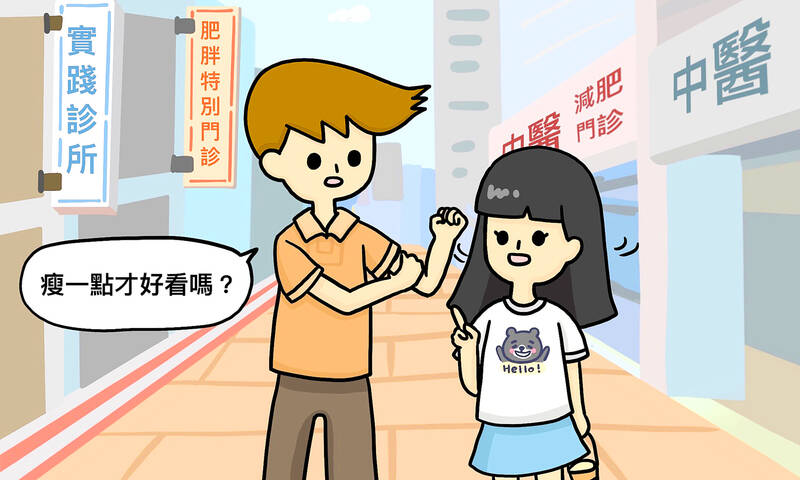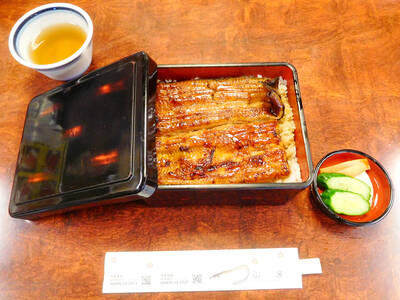馬克:小實,我發現臺北的街道上有好多減重診所喔!
Make: Xiǎoshí, wǒ fāxiàn táiběi de jiēdào shàng yǒu hǎoduō jiǎn zhòng zhěnsuǒ ō!
小實:喔,對啊,因為很多人有這個需求。

Xiaoshi: Ō, duì a, yīnwèi hěnduō rén yǒu zhège xūqiú.
馬克:大家都希望自己變得很瘦嗎?
Make: Dàjiā dōu xīwàng zìjǐ biànde hěn shòu ma?
小實:嗯,特別是女生,很多亞洲人認為瘦一點才好看。
Xiaoshi:En, tèbié shì nǚshēng, hěnduō yàzhōu rén rènwéi shòu yìdiǎn cái hǎokàn.
馬克:太瘦的話,反而不健康吧?
Make: Tài shòu dehuà, fǎn’ér bú jiànkāng ba?
小實:對,有的女生為了追求自己覺得完美的身材,反而犧牲了健康。
Xiaoshi: Duì, yǒude nǚshēng wèile zhuīqiú zìjǐ juéde wánměi de shēncái, fǎn’ér xīshēngle jiànkāng.
馬克:我覺得每個人的身材都不一樣,這很正常,只要健康就好。
Make: Wǒ juéde měigerén de shēncái dōu bùyíyàng, zhè hěn zhèngcháng, zhǐyào jiànkāng jiù hǎo.
小實:我非常同意你的看法,其實這幾年大家的觀念也慢慢地改變了。
Xiaoshi: Wǒ fēicháng tóngyì nǐ de kànfǎ, qíshí zhèjǐnián dàjiā de guānniàn yě mànmàn de gǎibiàn le.
馬克:健康還是最重要的,對吧!
Make: Jiànkāng háishì zuì zhòngyào de, duì ba!
小實:沒錯!
Xiaoshi: Méicuò!
翻譯 Translation
Mark: Xiaoshi, I found that there are many weight loss clinics on the streets of Taipei!
Xiaoshi: Oh, yes, because many people do seem to have this need.
Mark: Do you all want to be thin?
Xiaoshi: Well, many Asians, especially girls, think that they look good if they are thinner.
Mark: If you are too thin, it will be unhealthy, right?
Xiaoshi: Yes, some women sacrifice their health in order to pursue what they think is a perfect body.
Mark: I think everyone’s body is different, and that’s normal, as long as you’re healthy.
Xiaoshi: I couldn’t agree with you more. In fact, people’s ideas have gradually changed in recent years.
Mark: Health is the most important thing, right?
Xiaoshi: Exactly!
單字片語 Vocabulary
1. 減重 (jiǎn zhòng) lose weight
2. 診所 (zhěnsuǒ) clinic
3. 需求 (xūqiú) need
4. 反而 (fǎn’ér) instead
5. 追求 (zhuīqiú) pursue
6. 完美 (wánměi) perfect
7. 犧牲 (xīshēng) sacrifice
8. 其實 (qíshí) actually
9. 觀念 (guānniàn) way of thinking
10. 改變 (gǎibiàn) change
教材音檔 Audio Files
教材影片 Video Files:
https://www.instagram.com/celc.nou_tw/guide/_/17999106352646292/
實踐大學華語中心提供
By Shih Chien University Chinese Language Center: https://chineseusc.com/

Microsoft on Feb. 28 announced it was retiring Skype, the online voice and video call pioneer that the tech titan acquired in 2011. “Starting in May 2025, Skype will no longer be available,” said a post from Skype support on X, directing users to sign into Microsoft’s Teams platform for further use of its services. Skype was founded in 2003 by Scandinavians Niklas Zennstrom and Janus Friis in Estonia, revolutionizing Internet communication by offering free voice calls between computers and affordable rates for calls to landlines and mobile phones. Over the years, and as Internet speeds improved, Skype evolved to

Donburi, often simply called don, is a beloved Japanese dish that consists of a bowl of steamed rice topped with various other ingredients. The word donburi itself actually means “bowl” in Japanese, but it has come to represent much more than just a vessel. Donburi first emerged during the Edo period (1603–1867) as a quick and convenient meal for busy city dwellers. By the 19th century, donburi had become immensely popular among theater enthusiasts, who often purchased these portable meals to enjoy during long performances. Una-don, a donburi topped with grilled eel, was a particular favorite. Easy-to-carry and satisfying,

People desire a sense of purpose in their lives, but they often remain idle unless they have a clear reason to act. This concept is illustrated by the retirement paradox. People work hard to prepare for a future without work but find life meaningless after achieving that goal. A study was carried out to determine if a reason, even a minor one, could encourage idle people to take action. __1__ Upon finishing the first, they were instructed to drop it off at a location either right outside the room or at a spot farther away, which would take around

Continued from yesterday(延續自昨日) https://www.taipeitimes.com/News/lang Results showed that only 32 percent were willing to walk farther for the same candy, but 59 percent chose to do so when promised different candy. Researchers also discovered that students who walked farther reported feeling happier during the wait. __3__ Idleness aversion can be applied in various settings. For example, Uber uses animations and real-time updates to keep customers from being bored while waiting. It can also be used in the design of office buildings to reduce elevator traffic. During busy times, it takes a while to wait for an elevator. __4__ Recognizing the power